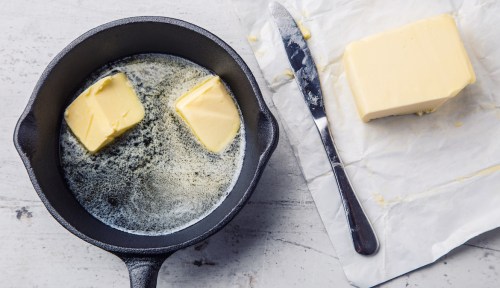Our editors independently select these products. Making a purchase through our links may earn Well+Good a commission
I Design Recipes With One of Today’s Most Elite Athletes—Here’s Why Butter Is Always on the Menu
Shalane Flanagan and Elyse Kopecky share why butter is good for athletes and anyone who asks a lot of the joints and muscles.

Butter makes life better: It’s simply a law of the universe. Whether you’re making eggs, soup, muffins, or steak, there’s no dish that can’t benefit from the dairy product. That’s why, when penning their most recent, breakfast-centric cookbook, Rise and Run, marathoners and friends Elyse Kopecky and Shalane Flanagan made sure that almost every recipe included the tastebud-pleasing fat. Now, they’re spreading the good word about why butter is good for athletes, everyday runners, and everyone.
Experts in This Article
culinary instructor, motivational speaker, and cookbook author
American long-distance runner, Olympic medalist, New York City Marathon champion, and global head coach of Nike Run Club
Kopecky, who just ran her debut marathon in New York City, says that—despite the bad rap it garnered from the fat-free craze in the ’80s—there’s a lot to love about your daily serving of butter. So much so that Flanagan—coach of Nike’s Bowerman Track Club, who just ran six marathons in 42 days in a venture called “Project Eclipse“—used it to fuel her body before taking off to run 26.2. “Shalane loves butter in baked wholesome treats. Our cookbook assistant, Natalie Bickford, stocked her freezer with all of Shalane’s favorites before she began her six-marathon adventure,” she says. Kopecky and Flanagan’s “superhero muffins”—which are the stuff of bake-stagram legend—even call for a stick or two. Why, you ask? Let’s get into it.
High-quality butter—preferably organic, grass-fed—is incredibly nutrient-dense, providing vitamins A, D, and E. Vitamin A is essential to a healthy cardiovascular system,” says Kopecky. Meanwhile vitamins D and E help you maintain healthy bones and support reproduction, as well as maintain the health of your skin, brain, and eye health. Not to mention, butter is also high in conjugated linoleic acid (CLA), a fatty acid that helps your muscles repair after strenuous exercise. “Athletes often obsess over protein, but protein isn’t the only building block for recovery. This healthy fat is also a natural anti-inflammatory and antimicrobial, which is important for preventing injuries and boosting your immune system,” adds Kopecky.
Butter is also high in conjugated linoleic acid (CLA), a fatty acid that helps your muscles repair after strenuous exercise.
In short, butter has a lot to offer—particularly for people who ask a lot of their joints and muscles on daily basis (whether that’s a long run or a long shift working at a hospital). So why does butter sometimes get written off? Well, it’s really because it contains about seven grams of saturated fat per serving. While saturated fat is completely fine in small amounts, the Office of Disease Prevention and Health Promotion (ODPHP) recommends that no more than 10 percent of your daily calories come from saturated fat. This is because too much saturated fat may increase your LDL cholesterol levels, and increase your risk of heart attack or stroke. One tablespoon of butter accounts for about 35 percent of that daily allotment, something that’s important to keep in mind when you’re deciding what to eat. And if you’re someone who’s dealing with high cholesterol, talk to your doctor about what role butter should play in your life.
Now, please excuse me why I make everything from Rise and Run. It’s going to be breakfast for dinner every night of the week around here (with a tablespoon or two of butter as well).
Oh hi! You look like someone who loves free workouts, discounts for cutting-edge wellness brands, and exclusive Well+Good content. Sign up for Well+, our online community of wellness insiders, and unlock your rewards instantly.
Sign Up for Our Daily Newsletter
Get all the latest in wellness, trends, food, fitness, beauty, and more delivered right to your inbox.
Got it, you've been added to our email list.










